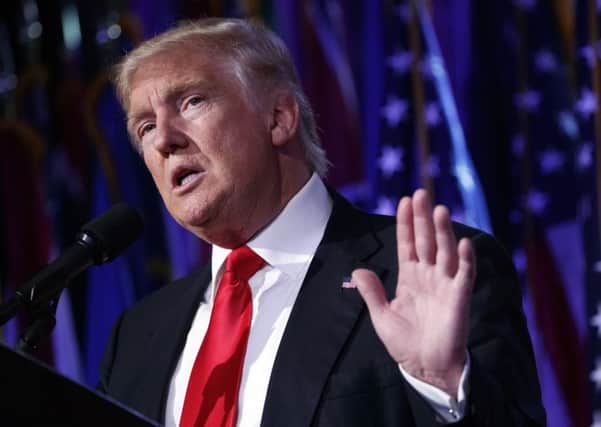Ian Swanson: We can't duck issue of how to deal with The Donald


The rare honour would be in dramatic contrast to the calls just last year – backed by more than 500,000 signatures – for him to be banned from entering the country.
Mr Trump’s shock victory two weeks ago has forced a rapid readjustment by politicians who had thought a President Trump was inconceivable but who must now cope with that sobering reality. They hope he also has to adjust and will tone down many of his campaign promises.
Advertisement
Hide AdAdvertisement
Hide AdBut even if he presses ahead with just half of his proposed measures it will still mean a disturbing and unprecedented lurch to the right in US politics. And while there are signs that some of the Washington insiders he so derided will after all find places in his team, Mr Trump’s initial appointments – including a man rejected as a judge because he was too racist, now proposed as attorney general – offer little comfort.
The election of Donald Trump is being seen as part of a global pattern of people turning against familiar politics and embracing the anti-establishment option. Other examples of this phenomenon are the Brexit vote in the UK, the likely strong showing of the National Front in the French presidential elections next year, forecasts of a defeat for Italy’s prime minister in a referendum on the constitution next month and fears of a right-wing victory in parliamentary elections in the Netherlands.
Scotland arguably had its anti-establishment vote two years ago in the independence referendum, though it could not be characterised as a move to the right and whether there would be another surge in support for independence if there were another vote is a moot point.
Scottish politicians have reacted to Mr Trump’s election with varying degrees of criticism. Nicola Sturgeon congratulated the new president but vowed she would not maintain a “diplomatic silence” in the face of any racism, misogyny or intolerance.
Advertisement
Hide AdAdvertisement
Hide AdLabour’s Kezia Dugdale said she was “heartbroken” at the result and “numb and confused” about how Americans could have elected him.
And Green Patrick Harvie said the election of “a racist, sexist bully” to the White House was “profoundly depressing”.
But it is worth remembering it was not always this way. Some of Scotland’s leaders were much more comfortable with The Donald in the past.
When he was First Minister in 2007 Alex Salmond supported Mr Trump’s controversial luxury golf development in Aberdeenshire despite strong local opposition.
Advertisement
Hide AdAdvertisement
Hide AdIt was only later, when Mr Trump got into a lather about plans for wind turbines off the coast, that the two men fell out.
And Mr Salmond’s predecessor, Labour’s Jack McConnell, was sufficiently impressed with Mr Trump – whose mother was born in Scotland – to make him a business ambassador for Scotland in 2006 by adding him to the list of “Global Scots”.
Ms Sturgeon removed that status last year and Robert Gordon University took away the honorary degree it had awarded Mr Trump.
And while Westminster makes its plans to receive the new president, Mr Trump has already been to the Scottish Parliament. He gave evidence to MSPs at Holyrood in 2012 on the wind farm row and boasted of his own expertise. The public gallery burst into laughter.